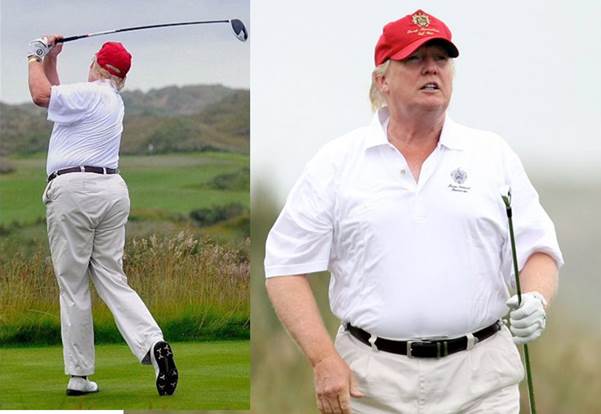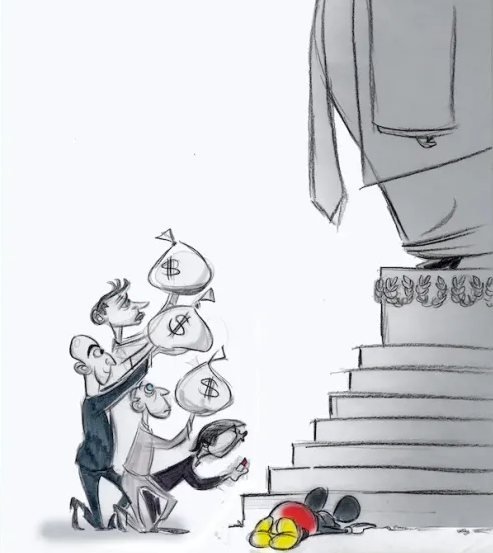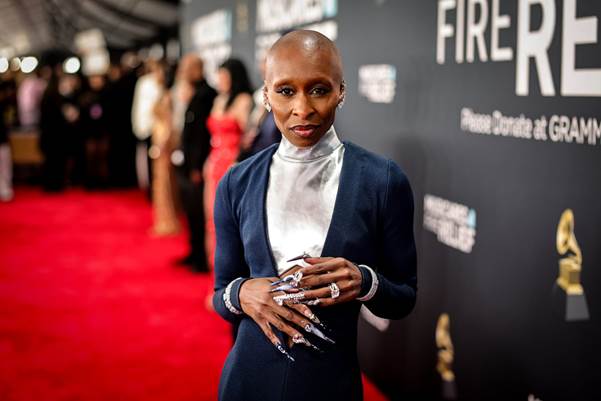Is It Ever OK to Mock People's Appearance? (Even If They're Bad?)

Well, Adam Conover just got himself cancelled, which is a shame. For those who don’t know, he’s a former CollegeHumor comedian who built a career off his myth-busting show Adam Ruins Everything. He’s also a prominent union activist, which is not something you typically suspect from a guy who looks like this all the time:

I like Adam a lot. What he does performatively is what I used to do professionally from behind a keyboard, and what he does would have worked very well at Cracked had he not been doing it for our primary competitor at the time. I also like the cut of his jib politically, and he has the type of attitude you’d think would go down very well on places like Bluesky.
It turns out, though, that a hell of a lot of people absolutely do not like Adam Conover, for reasons that surprised me and wound up making me think about a bunch of stuff that I’m now going to dump on you, my patient readers.
The reason for the dogpile is that Conover got called out spectacularly by Skepchick vlogger Rebecca Watson for doing what appears to be a paid promotion for some sort of OpenAI-adjacent cryptocurrency product called the “Orb.”
I also like Rebecca Watson a lot, which is what makes all of this so heartbreaking, and I gotta admit, what Conover did is pretty weird and uncharacteristic. The backlash against him on social media, though, contains a large number of often implicit and sometimes even explicit remarks about always having hated this guy, but never quite feeling they had permission to until right now.
But now! Now people are free to shout it loud and proud: They hate his stupid FACE, they hate his stupid VOICE, and this finally vindicates every gut feeling they had about him but felt they couldn’t express because he kept saying so many frustratingly agreeable things. Now that he’s slipped up, he’s finally given the permission everyone needed to get it off their chest that he’s ugly and he sucks.
This is even a remark that Watson herself opens with in this very same takedown video: That she’s not actually familiar with his work and in fact she’s actively avoided watching anything he’s done because he looks like such a wanker.
Although this “judge a book by its cover” type of thing, or judge a man by the loudness of his shirt, does feel like it chafes against the spirit of skepticism by leaning heavily into the “confirmation” component of “confirmation bias,” it did make me think about how often I use a person’s appearance to bolster criticisms I have about their personality. You’ll know exactly what I mean if you’ve ever seen me start a rant about Marc Andreessen and prayed to your preferred higher force that I come out with anything better than egg jokes this time.

The argument goes that such criticisms may have little affect if any on the actual target of the insult, but whether or not it does, it operates mainly as a general criticism of that particular physical feature. Anyone else who happens to have an egg-shaped head but who isn’t an asshole might pull their beanie down around their ears in embarrassment when they see me make a comment like that. Physical insults are a scattershot that creates collateral damage, and they’re completely divorced from the actual, real, criticism, unless you believe skull shape has some direct correlation with behaviour, in which case I will say, welcome to the 21st century, George Combe.

Now I’m somebody who has a loud, weird voice, and several times in my life I’ve been pulled aside by bosses, colleagues, even friends, to remind me that I have a very, uh, loud and distinct voice, where the true message delivered politely is that what I actually have is an annoying voice. So when someone like Adam Conover is criticized for their loud or weird or obnoxious voices I have to admit it does cut a little bit. So I can definitely see the collateral damage argument. But I also see some ominous slippery slopes being built up here.


Discourse about Conover and why it’s fine to attack him on appearance tend to point out that most of the criticism is based on things he controls, like hairstyle and clothing. That feels like it’s pretty close to the golden rule here, right? Criticize people for things that they can control. If you find someone’s style to be off-putting, then you have every right to be… well, put-off. If you find someone’s innate physical features off-putting, then keep that shit to yourself because it’s your problem to deal with. It shouldn’t make any difference whether you agree with that person’s politics.
Here's a recent case hot out of the oven for me. Take Peter Dutton, the leader (until recently) of Australia’s right-wing LNP Party. You might have heard in the news that we kicked this guy’s ass recently in a federal election in a spectacular and optimistic popular rebuke of his embrace of Trumpism. He looks like this:

I made so many Voldemort jokes in the lead-up to this election, and they wouldn’t have landed as well if not for the fact that his incumbent adversary looks like a just-past-middle-age and over-this-shit Harry Potter. I’ve described Dutton as looking like an amphibian.
For context, Dutton is an ambitious remora who gloms onto whatever political stance he thinks will propel him into power, and Trumpism was a perfect fit for that (he even invented and appointed a “Minister for DOGE” in advance of trying to roll out some stupid Elon Musk bullshit upon his anticipated victory). It’s a huge bullet dodge that we threw him completely out of government and relegated him to a watch-this-space certain remaining career rotting away in the Danube Institute or something, godspeed mate.
But as much as I try to defend my jokes by saying it’s, like, the optics of the LNP running a guy who looks like that, it’s still not his fault that he looks like that. He’s not shaving his head and eyebrows and putting on a cape and hissing at children and eating rats. The real litmus test here is: If this exact person shared my exact political views, would I be making similar wisecracks? Would I try for some kind of “Based Voldemort” angle or would I leave it alone?
That has to be the key here—Adam Conover can absolutely wear a different shirt, but Peter Dutton is pretty much stuck like that. It’s wrong to mock it or shame him for it because he can’t change it.
But here’s the thing: He kinda can, can’t he?
There’s a big red line somewhere between saying that Adam Conover should cut his hair to seem less off-putting, and that Peter Dutton should wear a hairpiece to seem less off-putting. One feels reasonable while the other feels offensive. There’s definitely an aspect to it where it matters what we think of the individual—I like Adam Conover, I think his style is fun and I don’t think he should get a crew cut. And while I make these Voldemort cracks about Peter Dutton, if he was someone I very much agreed with politically then I think I’d be very uncomfortable with people saying he should, like, get hair plugs or something.
I’m neither saying that either of these men are beyond criticism for their style, nor that we should be gloves off about mocking people for whatever we feel like mocking them for. That’s my whole point, really, is that the ethics of this type of thing are harder to pin down than they seem.
I used to write comedy and we’d mock people’s looks all the time, but there was a sense in which you wouldn’t say anything mean-spirited against someone who didn’t deserve it. But there’s definitely a growing mentality that it’s irrelevant if you think they deserve it, and that attacking anyone for their bodies or policing their self-expression contributes to a general misery culture.

And this feels like it’s gaining more momentum recently, while the rules seem to get more confused, especially when we’re talking about criticizing really bad people. During the first Trump presidency it was pretty common, if lazy, to see pictures of him bumbling around the golf course in unflattering shots that accentuate his large frame.

That’s now becoming less common. But the politics of dissing Trump aren’t straightforward. This is, of course, one of the most mockable men on the planet from a wide variety of angles, and the orange spray-tan criticism doesn’t seem to be going away (though it’s lost any impact it ever had through tireless repetition), but there’s a feeling of taboo about the weight aspect.
What about Trump’s combover hairstyle? That comes from baldness insecurity, as does Tim Pool famously wearing a beanie at all times even when inappropriate.

This feels like it should share a similar place on or off the table for mockery as being overweight, but I don’t think I’ve ever heard anyone suggest it’s wrong to mock either of these men for this specific thing—in fact, their baldness insecurity feels more acceptable to mock than Peter Dutton’s proud baldness. On the flip side, mocking weight insecurity is a much stronger taboo.
You see this as well with Elon Musk, who actually did get hair plugs to combat his baldness insecurity. People will freely share this old photo and laugh about it:

But if you laugh at this one:

…then you’ll get a lot of people saying “Hey, can we maybe not do this?”
While we’re navigating this sort of thing we need to keep in mind the art of caricature, which seems to have some immunity shields that regular discourse doesn’t have. Political cartoons are free to depict Trump as an enormous malformed orange blob of hair, mouth, and gut, so obese that he’s nearly spherical, and such images attract less criticism than unaltered photographs of his ass accompanied by a snide comment. Take this Pulitzer Prize winning cartoon by Ann Telnaes:

If we disregard genetic or health related issues like pattern baldness and weight, and just think about style and identity related stuff, it feels like there’s more room for criticism, but excessive style policing can also seem kinda… I don’t want to be as hyperbolic as “fash coded” but a little authoritarian for a free society.
White guys get the least wiggle-room here, of course. You can say that Adam Conover’s hair choice and general style are far too off-putting and he should change it, but I don’t think it would go down well at all if you said the same thing about Cynthia Erivo.

I don’t have any problem with either of them, to be clear. But I can see how the rules can appear arbitrary and difficult to navigate—because they are.
When you’re mocking bad people on their appearance or mannerisms it almost feels like you’re more constrained for the fear of implying inappropriate correlations between the feature you’re mocking and the fact that they’re a shitty person. You don’t want to demonize some particular trait in general by accidentally giving the impression that you’re attaching a moral value to it. I suspect, for example, there’s a general tendency for people to dodge or even deny the fact that Elon Musk is somewhere on the spectrum because it has complicated implications about which behaviours are available for mockery and just the desire to avoid any implication that he’s a garbage human being because of that.
But see, this is where we get kind of a problematic situation where we’re walking on eggshells about criticizing assholes while leaving the gloves off for everyone else. Take the juxtaposition in this Saturday Night Live skit which appears to really pull its punches with Robert Kennedy Jr’s voice while going full throttle on Aimee Lou Wood’s teeth.
I despise bullying but I also think that we tread way too much of a minefield when it comes to this sort of stuff and I think the problem is this: We are trying to lock down some ideal position on a line, both ends of which are utterly unfeasible and undesirable modes of living: On one end everybody is free to express themselves in any way they choose without criticism within an utterly humourless void of tone policing and second-guessing, or on the other end, some authoritarian hell of bullying and conformity.
We can only find our vibe somewhere in the in-between, but seek to keep the balance of our souls, our dignity, our sense of justice, our restraint, and our sense of humour, while keeping in mind who the bad guys are.
I'm writing a book about the bad guys, and it delves into the history of things like internet hate mobs and how internet culture hijacked western politics within a single generation. The working title is How Geeks Ate the World and I’m going to be dropping parts of the draft into this very newsletter as the project comes along—but only for paid subscribers. So if you want to read along in real time, please consider subscribing. Otherwise I’ll be keeping you in the loop. Check it out here:









